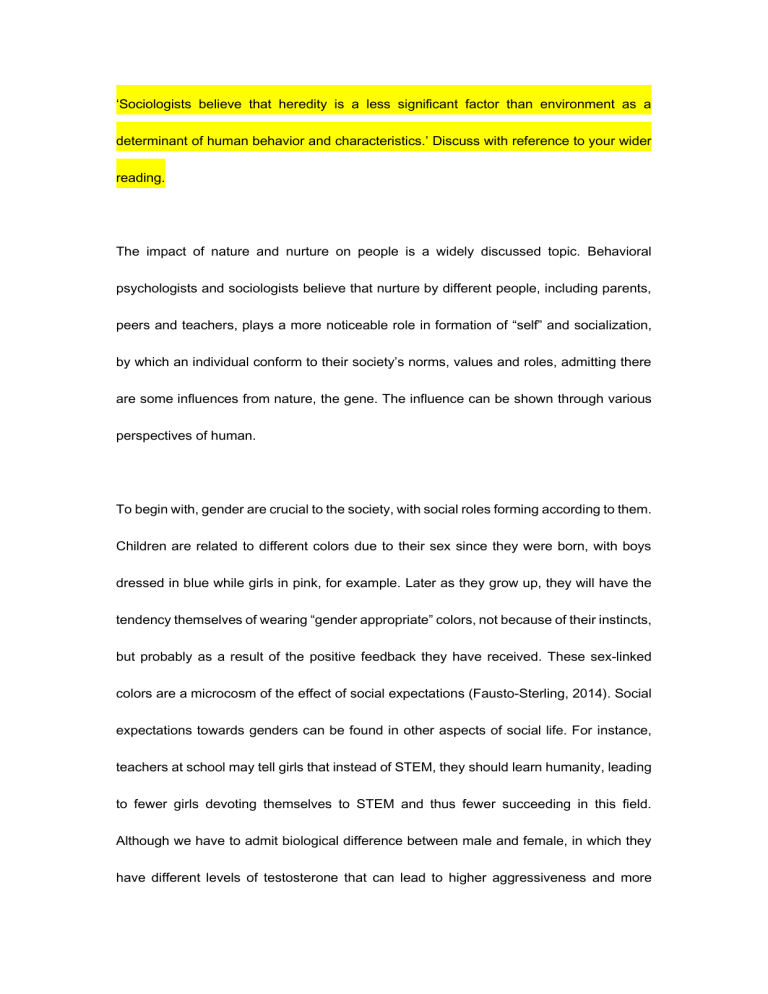
‘Sociologists believe that heredity is a less significant factor than environment as a determinant of human behavior and characteristics.’ Discuss with reference to your wider reading. The impact of nature and nurture on people is a widely discussed topic. Behavioral psychologists and sociologists believe that nurture by different people, including parents, peers and teachers, plays a more noticeable role in formation of “self” and socialization, by which an individual conform to their society’s norms, values and roles, admitting there are some influences from nature, the gene. The influence can be shown through various perspectives of human. To begin with, gender are crucial to the society, with social roles forming according to them. Children are related to different colors due to their sex since they were born, with boys dressed in blue while girls in pink, for example. Later as they grow up, they will have the tendency themselves of wearing “gender appropriate” colors, not because of their instincts, but probably as a result of the positive feedback they have received. These sex-linked colors are a microcosm of the effect of social expectations (Fausto-Sterling, 2014). Social expectations towards genders can be found in other aspects of social life. For instance, teachers at school may tell girls that instead of STEM, they should learn humanity, leading to fewer girls devoting themselves to STEM and thus fewer succeeding in this field. Although we have to admit biological difference between male and female, in which they have different levels of testosterone that can lead to higher aggressiveness and more physical power, biology simply affects more shallow, physical, or emotional things (Kimmel, 2017). In addition, the ability to vocalize and express clearly is also essential for individuals to contact and communicate with others in the society. The cases of monkey boy and wolf girls demonstrate the significance of socialization at a small age on communication. While monkey boy learnt to speak subsequently, as he had learnt some speech before his stay in the wild, wolf girls that had long lived with wolves can only speak a few words after training. Besides basic words and expression, people require skills to convey their opinions more clearly. This can be largely improved through training programs (Simmenroth-Nayda et al., 20120. Moreover, the living habit including preference of food, time to bed, way of walking, etc. The wolf girls have a preference to eat raw meat instead of cooked food because they were nurtured by wolf with this habit and lived in forest where there is no cooked food. According to Flides (2014), nurture has a significant impact on choice of snacks, dairy and starches. Other ways of living are also mainly determined by the society through education and training, including the daily routine and the gestures a person prefers to do, as people will be praised if they follow social norms and punished if different. In conclusion, although some people like Freud arguing that human behaviors are determined by instincts and these instincts are biologically determined, most sociologist hold the opinion that the effect of social interaction with other people, the immersion in culture and adaptation to social expectation play a much larger role in shaping people’s identities and personalities. References DeLamater, J. D., & Hyde, J. S. (1998). Essentialism vs. social constructionism in the study of human sexuality. Journal of Sex Research, 35(1), 10–18. https://doi.org/10.1080/00224499809551913 Fausto-Sterling, A. (2014, December 18). Footnote: Where Does Gender Come From? Dr. Anne Fausto-Sterling. http://annefaustosterling.com/footnote-gender-come/ Fildes, A., van Jaarsveld, C. H., Llewellyn, C. H., Fisher, A., Cooke, L., & Wardle, J. (2014). Nature and nurture in children’s food preferences. The American Journal of Clinical Nutrition, 99(4), 911–917. https://doi.org/10.3945/ajcn.113.077867 Kimmel, M. S. (2017). The gendered society (6th ed.). Oxford University Press. Simmenroth-Nayda, A., Weiss, C., Fischer, T., & Himmel, W. (2012). Do communication training programs improve students’ communication skills? - a follow-up study. BMC Research Notes, 5(1). https://doi.org/10.1186/1756-0500-5-486 Write a list of sociologists who have written about the issues and the articles they have written. Emile Durkheim Notable Article: "The Rules of Sociological Method" (1895) Durkheim's work laid the foundation for the field of sociology. While he didn't directly focus on the nature vs. nurture debate, his emphasis on social structures and institutions influenced discussions around how social factors impact individuals. Erving Goffman Notable Article: "The Presentation of Self in Everyday Life" (1956) Goffman's dramaturgical theory explored how individuals perform their identities in social interactions, shedding light on the interplay between nature (individual disposition) and nurture (social context). George Herbert Mead Notable Article: "Mind, Self, and Society" (1934, posthumous) Mead's work on symbolic interactionism highlighted how individuals develop their sense of self through social interactions, contributing to discussions about the balance between innate characteristics and social influences. Talcott Parsons Notable Article: "The Social System" (1951) Parsons' structural-functionalism emphasized the role of social systems in shaping individual behavior and values, contributing to debates about the relative importance of nature and nurture. Pierre Bourdieu Notable Article: "The Forms of Capital" (1986) Bourdieu's concept of cultural capital and habitus explored how social structures and cultural practices influence individual success and social mobility, addressing the interplay between nature and nurture. Nancy Chodorow Notable Article: "The Reproduction of Mothering: Psychoanalysis and the Sociology of Gender" (1978) Chodorow's work on psychoanalytic theory and gender argued that early maternal relationships play a crucial role in the development of gender roles and identity, contributing to the nature vs. nurture debate in the context of gender socialization. Randall Collins Notable Article: "Conflict Sociology and the Conflict Theory of War" (1975) Collins' work on conflict theory and the sociology of violence explored how social dynamics and power struggles can influence individual and collective behavior, touching on the nature vs. nurture question in the context of conflict. Ann Swidler Notable Article: "Culture in Action: Symbols and Strategies" (1986) Swidler's research on culture and society discussed how cultural symbols and practices impact individual decision-making and behavior, contributing to discussions about the role of culture in shaping human actions.
